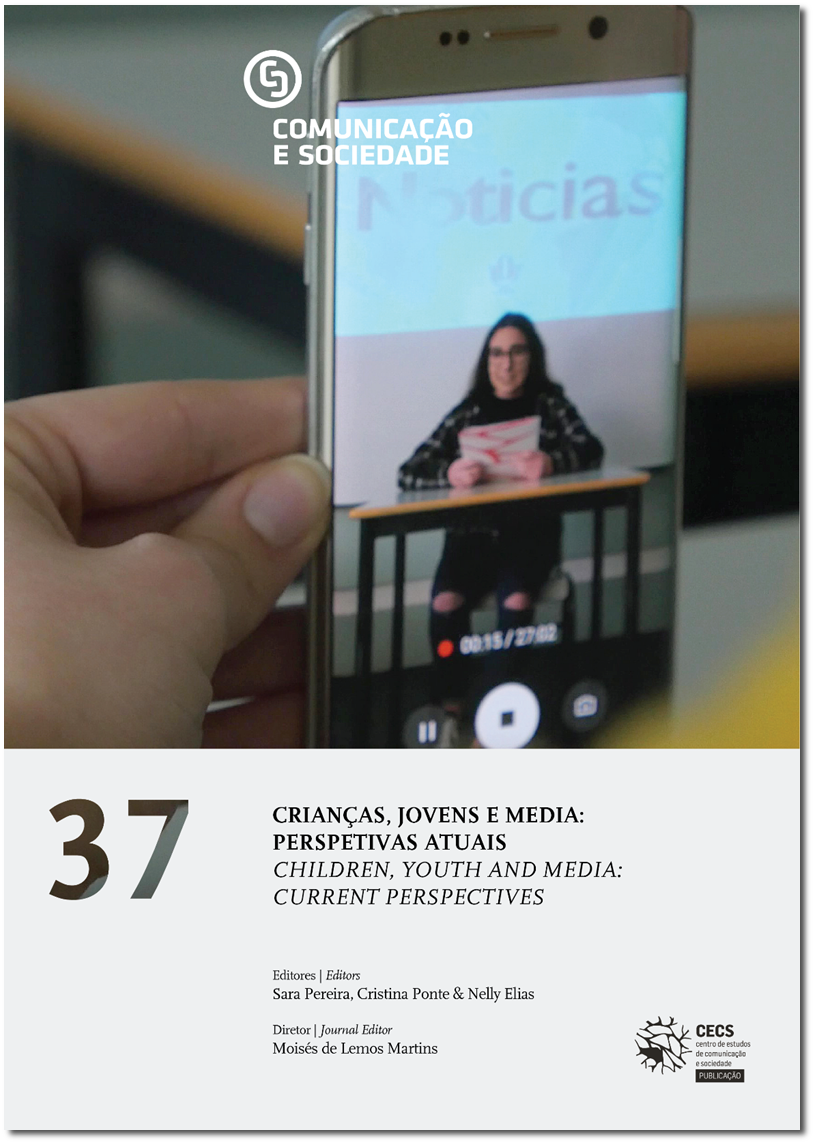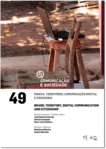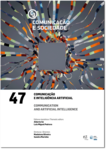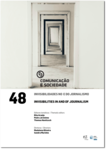A domesticação de ecrãs na infância: usos e mediação parental em meios citadino e rural
DOI:
https://doi.org/10.17231/comsoc.37(2020).2411Palavras-chave:
ecrãs, infância, usos e mediação, espaço doméstico, contexto urbano, contexto ruralResumo
Este estudo procura caracterizar a utilização dos ecrãs no espaço doméstico em função dos contextos citadino e rural das crianças até aos cinco anos e conhecer como a família intervém na sua introdução e utilização. Para o efeito foram realizados quatro grupos de foco com crianças de quatro e cinco anos residentes na cidade de Lisboa e em Vila Pouca de Aguiar, no distrito de Vila Real e oito entrevistas semiestruturadas com pais e mães de ambos os contextos, chegando a várias conclusões: 1) as crianças do contexto rural são mais utilizadoras dos ecrãs em casa que as crianças da cidade; 2) os pais/mães de ambos os contextos são os responsáveis pelo acesso dos filhos aos ecrãs, sobretudo smartphones e tablets; 3) a principal explicação é a preocupação dos pais/mães com a exclusão social das crianças caso não os utilizem; 4) os progenitores/as do meio urbano denotam uma maior perceção dos riscos associados à exposição dos filhos aos dispositivos tecnológicos.Downloads
Referências
Ariani, A., Putu, N., Aditya, R., Endriyani, N. & Niati, R. (2017). Effects of playing gadget on elementary school children in urban and rural environment. Advances on health sciences research, 2, 22-27.
Baumrind, D. (1991). The influence of parenting style on adolescent competence and substance use. Journal of Early Adolescence, 11(1), 56-95.
Bell, V., Bishop, D. V. M. & Przybylski, A. K. (2015). The debate over digital technology and young people. BMJ, 351, h3064. https://doi.org/10.1136/bmj.h3064
Beyens, I. & Eggermont, S. (2014). Putting young children in front of the television: antecedents and outcomes of parents. Use of television as a nabysitter. Communication Quarterly, 62(1), 57-74.
Blum-Ross, A. & Livingstone, S. (2018). The trouble with “screen time” rules. In G. Mascheroni; C. Ponte & A. Jorge (Eds), Digital parenting. the challenges for families in the digital age (pp. 179-187). Goteborg: Nordicom.
Brito, R. (2018). Estilos de mediação do uso de tecnologias digitais por crianças até aos 6 anos. Da Investigação às Práticas, 8(2), 21-46.
Bryman, A. (2016). Social research methods. Oxford University Press.
Cardoso, G., Mendonça, S., Paisana, M., Lima T. & Neves, M. (2015). Os media e as dinâmicas geracionais na sociedade Portuguesa. Análise dos impactos das variáveis geracionais nas práticas mediáticas dos portugueses. Lisboa: OberCom.
Cardoso, G., Vieira, J. & Mendonça, S. (2016). Ecrãs em rede. Televisão. Tendências e prospectivas. Lisboa: OberCom Investigação e saber em comunicação.
Çetintaş, H. B. & Turan, Z. (2018). Through the eyes of early childhood students: television, tablet computers, internet and smartphones. Central European Journal of Communication, 11(1), 56-70.
Clark, L. S. (2013). The parent app: understanding families in the digital age. Oxford: Oxford University Press.
Cordeiro, M. (2015). Crianças e famílias num Portugal em mudança. Lisboa: Fundação Francisco Manuel dos Santos
Council on Communications and Media. (2013). Children, adolescents, and the media. Pediatrics, 132(5), 958-961.
Dias, P. & Brito, R. (2018). Happy kids. Aplicações seguras e benéficas para crianças felizes. Perspetiva dos pais. Lisboa: Universidade Católica Portuguesa.
Domingues-Montanari, S. (2017). Clinical and psychological effects of excessive screen time on children. Journal of Paediatrics and Child Health, 53(4), 333-338.
Domoff, S. E., Radesky, J. S., Harrison, K., Riley, H., Lumeng, J. C. & Miller, A. L. (2019). A naturalistic study of child and family screen media and mobile device use. Journal of Child and Family Studies, 28(2), 401-410.
Duch, H., Fisher, E.M., Ensari, I. & Harrington, A. (2013). Screen time use in children under 3 years old: a systematic review of correlates. International Journal of Behavioral Nutrition and Physical Activity 10. Retirado de http://www.ijbnpa.org/content/10/1/102
Evans, C. A., Jordan, A. B. & Horner, J. (2011). Only two hours? A qualitative study of the challenges parents perceive in restricting child television time. Journal of Family Issues, 32(9), 1223-1244.
Gottschalk, F. (2019) Impacts on technologies use on children: exploring literature on the brain, cognition and well-being. OECD Education Working Paper No. 195. https://doi.org/10.1787/19939019
Harris, L., Davis, N., Cunningham, U., de Vocht, L., Macfarlane, S., Gregory, N., Aukuso, S.,Taleni, T.O. & Dobson, J. (2018). Exploring the opportunities and challenges of the digital world for early childhood services with vulnerable children. International Journal of Environmental Research and Public Health, 15(11), 2407. https://doi.org/10.3390/ijerph15112407
Holloway, D. J., Green, L. & Stevenson, K. J. (2015). Digitods: toddlers, touch screens and Australian family life. Brisbane: Queensland University of Technology. Retirado de https://ro.ecu.edu.au/ecuworkspost2013/1777
INE, Instituto Nacional de Estatísticas. (2011). Censos da População e da Habitação. Lisboa: INE.
INE, Instituto Nacional de Estatísticas. (2015). Sociedade da informação e do conhecimento – inquérito à utilização de tecnologias. Lisboa: INE.
Jorge, A., Tomé, V. & Pacheco, R. (2017). Um dia na vida de crianças com menos de 3 anos: os meios digitais no quotidiano das famílias. In M. I. V. Lopes; N. Ribeiro; G. G. S. Castro & C. D. Burnay (Org.), Atas do XV Congresso IBERCOM (pp. 3486- 3505). Lisboa: ASSIBERCOM.
Kabali, H., Irigoyen, M., Nunez-Davis, R., Budacki, J., Mohanty, S., Leister, K. & Bonner, R. (2015). Exposure and use of mobile media devices by young children. Pediatrics, 136(6), 1–7.
Kardefelt-Winther, D. (2017). How does the time children spend using digital technology impact their mental well-being, social relationships and physical activity?: an evidence-focused literature review. Florença: Unicef Office of Research-Innocenti.
Köksalan, B., Aldim, U. F. & Göğebakan, S. (2019) Media consuming in children: child development, babyhood (0-2), early childhood, interests. In S. Gülsah & S. Gülah (Eds). Handbook of research on children’s consumption of digital media (pp. 41-59). EUA: IGI Global.
Leskova, A., Jurjewicz, H., Lenghart, P. & Bacik, P. (2018). Current challenges of digital technologies. Communications-Scientific letters of the University of Zilina, 20(1A), 16-21.
Livingstone, S. (1998). Mediated childhoods: a comparative approach to young people’s changing media environment in Europe. European journal of communication, 13(4), 435-456.
Livingstone, S. & Byrne, J. (2018). Parenting in the digital age. The challenges of parental responsibility in comparative perspective. In G. Mascherone; C. Ponte & A. Jorge (Eds.), Digital parenting. The challenges for families in the digital age (pp. 19-30). Goteborg: Nordicom.
Livingstone, S. & Helsper, E. (2008). Parental mediation and children’s internet use. Journal of Broadcasting & Electronic Media, 52(4), 581-599.
Livingstone, S., Mascheroni, G., Dreier, M., Chaudron, S. & Lagae, K. (2015). How parents of young children manage digital devices at home: the role of income, education and parental style. Londres: EU Kids Online, LSE.
Mendoza, K. (2009). Surveying parental mediation: connections, challenges and questions for media literacy. The Journal of Media Literacy Education, 1(1), 28-41.
Nathanson, A. (1999), Identifying and explaining the relationship between parental mediation and children’s aggression. Communication Research, 26(2), 124-143.
Nevski, E. & Siibak, A. (2016). Mediation practices of parents and older siblings in guiding toddlers’ touchscreen technology use: an ethnographic case study. Media Education Studies & Research, 7, 320–340.
Nikken, P. (2019). Parents’ instrumental use of media in childrearing: relationships with confidence in parenting, and health and conduct problems in children. Journal of Child and Family Studies, 28(2), 531-546.
Nikken, P. & de Haan, J. (2015). Guiding young children’s internet use at home: problems that parents experience in their parental mediation and the need for parenting support. Cyberpsychology: Journal of Psychosocial Research on Cyberspace, 9(3). https://www.doi.org/10.5817/CP2015-1-3
Nikken, P. & Jansz, J. (2014). Developing scales to measure parental mediation of young children’s internet use. Learning, Media and Technology, 39(2), 250-266.
Nikken, P. & Schols, M. (2015). How and why parents guide the media use of young children. Journal of Child and family Studies, 24(11), 3423-3435.
Nikolopoulou, K. (2020). Preschool children’s use of tablet at home and parents’ views. In S. Papadakis & M. Kalogiannakis (Eds.), Mobile learning applications in early childhood education (pp. 209-229). Hershey: IGI Global.
Nomaguchi, K. M. (2009). Change in work-family conflict among employed parents between 1977 and 1999. Journal of Marriage and Family, 71(1), 15–32.
Ofcom, The Office of Communications. (2019). Children and parents: media use and attitudes report. Londres: Office of Communications.
Patraquim, C., Ferreira, S., Martins, H., Mourão, H., Gomes, P. & Martins, S. (2018). As crianças e a exposição aos media. Nascer e Crescer, 27(1), 11-21.
Paudel, S., Jancey, J., Subedi, N. & Leavy, J. (2017). Correlates of mobile screen media use among children aged 0–8: a systematic review. BMJ Open, 7(10), 1-12.
Plowman L, McPake, J. & Stephen, C. (2010). The technologisation of childhood? Young children and technology in the home. Children and Society, 24(1), 63-74.
Ponte, C. & Vieira, N. (2008). Crianças e internet, riscos e oportunidades. Um desafio para a agenda de pesquisa nacional. In M. L. Martins & M. Pinto (Eds.), Comunicação e Cidadania. Actas do 5º Congresso da SOPCOM (pp. 2732-2741). Braga: CECS.
Ponte, C., Simões, J., Batista, S. Castro, T. & Jorge, A. (2017). Crescendo entre ecrãs. Usos dos média por crianças de 3 a 8 anos – relatório final. Lisboa: ERC – Entidade Reguladora para a Comunicação Social.
Prensky, M. (2001). Digital natives, digital immigrants. On the Horizon, 9(5), 1-6.
Przybylski, A. K. & Weinstein, N. (2019). Digital screen time limits and young children’s psychological well-being: evidence from a population-based study. Child Development, 90(1), 56-65.
Twenge, J. M. & Campbell, W. K. (2018). Associations between screen time and lower psychological well-being among children and adolescents: evidence from a population-based study. Preventive Medicine Reports, 12, 271-283.
Weber, S. & Mitchell, C. (2008). Imaging, keybording, and posting identities: young people and new media technologies. Youth, Identity, and Digital Media, 25-48.
Downloads
Publicado
Como Citar
Edição
Secção
Licença
Os autores são titulares dos direitos de autor, concedendo à revista o direito de primeira publicação. O trabalho é licenciado com uma Licença Creative Commons - Atribuição 4.0 Internacional.











